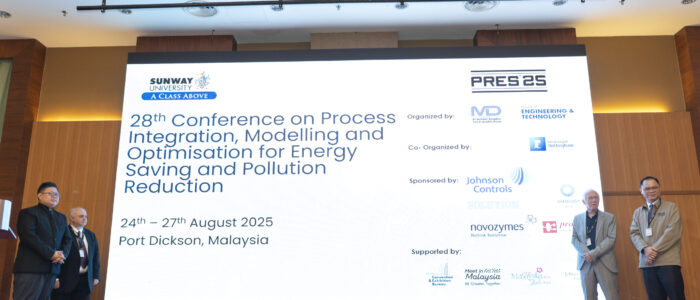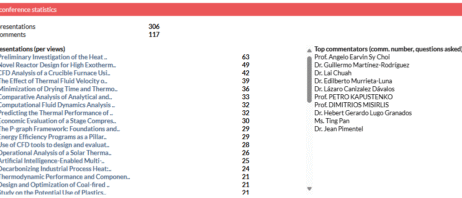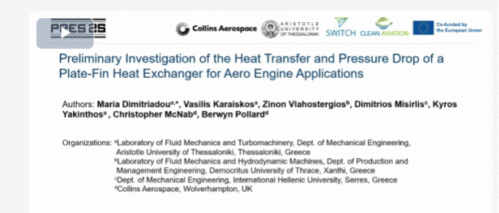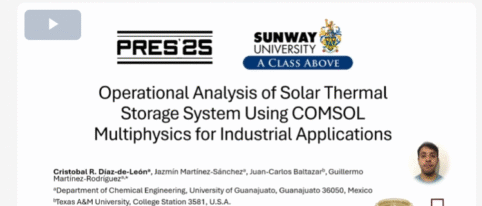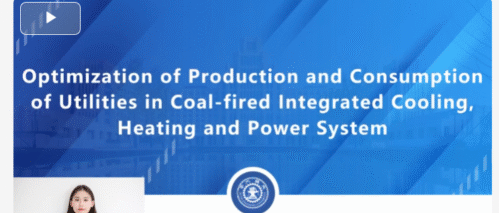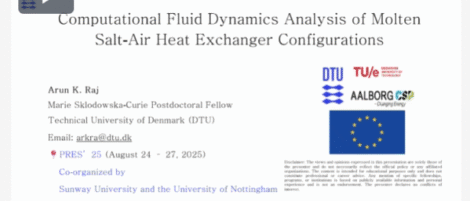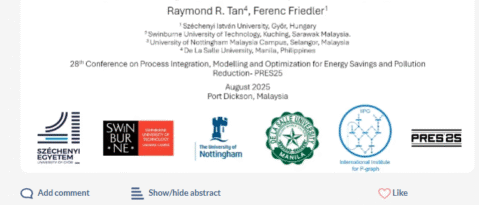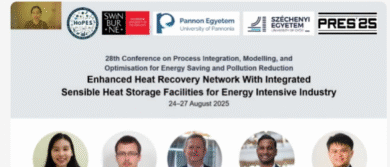Newsletter of the PRISE International Research Foundation, Vol.1, Issue 2
16 October 2025, Veszprém, Hungary
Download PDF
PRES’25 Online Conference Synopsis
The 28th Conference on Process Integration, Modelling and Optimisation for Energy Saving and Pollution Reduction (PRES’25) not only welcomed participants in Port Dickson but also offered a vibrant virtual programme via the SDEWES platform.
The online sessions provided broad access to presentations, interactive Q&A, and engagement with the global community of process integration researchers. The virtual platform allowed participants worldwide to revisit recorded talks, browse posters, and contribute to discussions, extending the reach and impact of PRES’25 well beyond Port Dickson.
The online conference platform has two enormously beneficial features:
- It encourages all conference participants, both online-only and on-site presenters, to upload their presentations to the online platform. This is crucial for allowing online-only participants access to the full spectrum of the conference content.
- The combination of pre-recorded videos with the comments section below each presentation video enables the viewers to watch the lectures at their convenience. Moreover, the videos can be played multiple times. The commenting section has proved a very successful vehicle for scientific discourse, enabling both experienced and novice researchers to ask questions freely.
The PRES’25 Virtual Conference showcased an impressive breadth of research, organised into 11 thematic tracks. The programme reflected the diversity and vitality of the process integration community, spanning:
- Process analysis, modelling and optimisation
- Waste minimisation, processing and management
- Heat transfer and heat exchangers
- Footprint minimisation and mitigation
- Energy saving and clean technologies
- Numerical fluid flow and heat transfer simulation
- Sustainable processing and production
- Renewable and high-efficiency utility systems
- Process integration for sustainable development and Process integration and sustainable development
- Poster sessions (1&2)
In the virtual programme, the Heat Transfer and Heat Exchangers track received the highest overall attention, emerging as the most followed theme online. Close behind were the Energy Saving and Clean Technologies sessions and the Process Analysis, Modelling and Optimisation track, both of which attracted strong levels of participation and interaction. Overall, the virtual component featured 306 presentations with 117 comments posted.

Overview of PRES’25 virtual participation statistics from the SDEWES platform
Most Engaging Presentations
From the wide range of contributions to PRES’25 Online, six presentations were selected to illustrate the diversity of research covered. They span topics from solar-thermal storage and CFD-based reactor modelling to process integration frameworks and heat recovery networks. The following figures present snapshots of these highlights as captured on the virtual platform.
 |
 |
| Transfer and Pressure Drop of a Plate-Fin Heat Exchanger for Aero Engine Applications | Operational Analysis of a Solar Thermal Storage System Using COMSOL Multiphysics for Industrial Applications |
 |
 |

The P-graph Framework: Foundations and Extensions for Industrial and Regional Energy Optimization Supporting Decarbonization |

Enhanced Heat Recovery Network With Integrated Sensible Heat Storage Facilities for Energy Intensive Industry |
Concluding Remarks
The PRES’25 Virtual Conference provided an inclusive platform that complemented the on-site sessions and extended the reach of the event worldwide. With over 200 contributions across 11 thematic tracks, the online component enabled researchers to share results, revisit recorded talks and engage in discussions beyond geographical limits. The selected highlights illustrate the wide spectrum of research interests, ranging from detailed heat transfer studies to system-level optimisation approaches. Together, they reaffirm the strength of the PRES community in advancing sustainable process integration through both physical and virtual participation.

